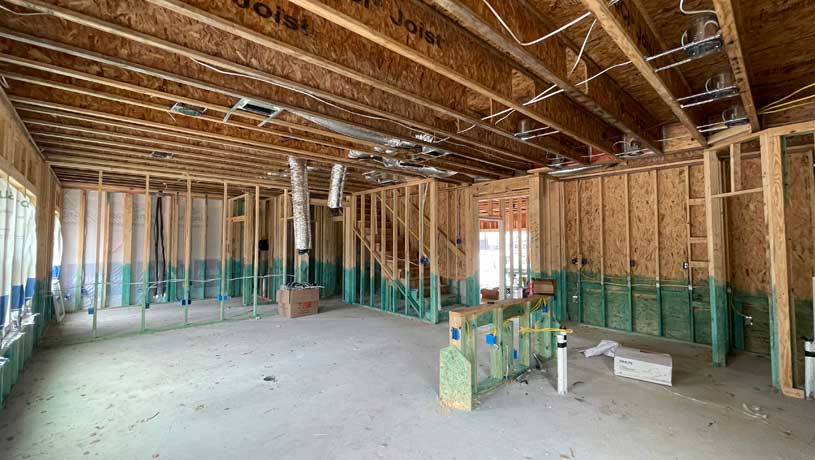Home Builder Contract Pitfalls: What to Look For
Published on MARCH 14, 2023 by ROB HASTINGS
CATEGORIES: New Construction | Buyer Resources
-
KEY POINTS: Home Builder Contract Pitfalls
• Builder contracts are written to protect the builder and the builder's interests.
• Learn 7 potential pitfalls in the builder's purchase agreement.
• Understand how to navigate these obstacles and protect yourself.
• Indentify erroneous fees in a home builder's contract and how to negotiate them.
Buying a new construction home can be very exciting, and choosing the right home builder is a crucial step in the process.
However, most builders use their own contracts that you must agree to in order to purchase the builder's home.
Unfortunately, these contracts are written to primarily protect the builder and the builder's interests. It's important to be aware of specific terms in these contracts so you can know exactly what to expect from your builder.
Here are 7 potential pitfalls to look for in a home builder's contract.
1. Builder Substitutions
-
Buyer authorizes Seller (i) to substitute colors that Seller deems compatible with the color scheme of the home, and (ii) to substitute standard features, appliances, equipment, or optional items of comparable quality.
This clause in the home builder's contract allows the builder to substitute colors or materials that you selected for other colors or materials that you didn't select.
Not cool, right?
The builder may need to make a substitution due to material availability, but I have also seen builders fall back on this clause when a mistake has been made and the builder doesn't want to spend the time or money to fix it.
Establish a good relationship with the builder's project supervisor for your home. Communicate often and ask regularly if there is any difficulty procurring the materials or items you selected for your home.
This relationship and communication usually results in the builder asking for the buyer's input if a substitution has to be made.
2. Completion Time
-
Seller has an obligation to substantially complete and deliver the Home within twenty-four (24) months from the date Buyer executes this Agreement.
What? Two years to complete the home? The builder said it would be completed in 6 to 8 months!
Unfortunately, this is a provision in most new construction contracts that gives the builder two years to build and deliver the home. While most builders do complete their home builds in their stated timeframes, it is important to understand that this clause exists.

Frustrated by the lack of work being completed on your home? Read your contract to determine how long the builder has to complete construction.
During the COVID-19 pandemic, when supply shortages for building materials and lack of labor were commonplace, many builders exercised this clause in their contracts and took 12 to 24 months to deliver homes in our local real estate market.
Buyers should understand the environment in which they are purchasing and know that this possibility exists. While such delays are rare, buyers should make alternative plans for housing should their new homes not be completed in the expected timeframe.
3. Price Increases Due to "Uncontrollable Events"
-
If Seller is prevented, hindered, or delayed from completing home in a twelve (12) month period because of one or more Uncontrollable Events, Seller shall be entitled to such additional time as is reasonably necessary to complete the Home. Any increases in costs of construction of the Home which occur by reason of such delay shall be added to the Purchase Price with Seller's standard markup and administrative fees payable to Seller.
The list of things that constitute "Uncontrollable Events" includes:
(1) Buyer's change orders,
(2) Buyer's failure to make selections of options,
(3) casualties,
(4) acts of God,
(5) acts or war,
(6) acts of terrorism,
(7) material shortages,
(8) labor difficulties,
(9) strikes,
(10) fuel shortages,
(11) delays in obtaining required approvals or permits, or
(12) "other conditions beyond the Seller's control."
Wow. This is some vague contract verbiage that gives the builder the leverage to increase the price of your home for virtually any reason they deem outside of their control.
I also saw this clause enacted during the COVID-10 pandemic as builders faced those same supply and labor shortages. In one case, a builder attempted to increase the purchase price for our clients by $40,000, but fortunately, after pushing back, we were able to negotiate much less.
If such language exists in your new home purchase agreement, it's important to know your options. In most cases, buyers will be able to terminate the contract and receive their earnest money deposit back in full if they are not willing to pay the increased amount.
4. Change Orders
-
If Buyer requests a structural or non-structural change to the Home after execution of this Agreement, Buyer shall pay change order fees which shall be non-refundable.
There may be times during the construction process when you decide to make changes to the original plans or selections. A good home builder's contract should outline the process for making these changes, including how much they will cost and how they will impact the project timeline.
Understandably, the builder must include contract language such as this as buyers would likely make several changes if such language was not in the contract, delaying closing and incurring costs for the builder.
However, the costs for even simple change orders - such as changing the color of the front door - can be thousands of dollars, so it's important to (1) be confident in your initial selections and (2) know the costs if you change your mind.
5. Time Allotted for Design Selections
-
Buyer shall have up to two (2) hours at the Design Selection Appointment. If Buyer needs additional time, additional Design Selection Appointments may be purchased for an additional price of $250.00 per hour.
One of the most fun parts of building a new home is design selection.
From flooring to kitchen cabinets to wall colors, the design appointment is filled with several decisions.

The design appointment is one of the most exciting parts of the journey for buiding a new home.
However, it's important to understand the time allotted by the builder in the contract for your design appointment and the associated cost if you exceed this time limit.
In order to ensure you can make quick decisions in the design appointment and not incur additional costs, ask the builder if you can do a "preview" in the design center. This allows you to view the options available and gain an understanding of what you like prior to the design appointment.
6. Erroneous Fees
-
Buyer acknowledges and agree that in connection with the purchase of the Home, Buyer shall pay to Seller a contract Builder Fee, equal to $749 (the "Builder Fee"). [...] The Builder Fee represents additional compensation to Seller.
Look for additional fees in the contract that you may not have been expecting. These costs will appear on your settlement statement as a closing cost, so it's important that such fees are accounted for in your financial planning.
As mentioned previously, this is the builder's contract; it is meant to benefit and protect the builder. But fees such as this can often be eliminated with some good negotiation by your realtor, so don't be afraid to attempt to reduce costs by negotiating this fee.
7. Scope of Work
The scope of work is a critical component of any home builder's contract. It should outline in detail what work the builder will undertake, what materials they will use, and how long the project will take. This section should also include any plans, specifications, and drawings that the builder will use to construct your home.
Do not rely on any verbal statements in regard to scope of work.
For example, if a builder site agent mentions that all homes are built with 2x6 framing, ensure that this provision in annotated in your contract. Likewise, if it's mentioned that a certain R-value of insulation is used, be sure this R-value is indicated in writing.
Buyers are often disappointed when they say, "But the builder's agent said..."
Bottom Line
In conclusion, a home builder's contract is a critical document for your new construction process.
It's important to take the time to review the contract carefully and ensure it includes all the necessary details. At the same, it's important to recognize that the contract is written to benefit and protect the builder, so understanding those provisions and planning accordingly is essential.
By doing so, you will have a smooth and successful home building experience without the disappointment of unmet expectations.
Related Articles:
5 First Time Home Buyer Mistakes to Avoid
ABOUT THE AUTHOR:

Rob Hastings is a top-producing real estate agent in Jacksonville, Florida and helps buyers, sellers, and investors of homes and property throughout all of Northeast Florida. He works with his wife Nancy as a husband-and wife-team with Keller Williams Realty Atlantic Partners. When not helping his clients navigate the real estate process, Rob enjoys working on old Corvettes and playing music (guitar and piano). A U.S. Naval Academy graduate and former Naval Officer, he also loves boating and simply spending time on the water.
